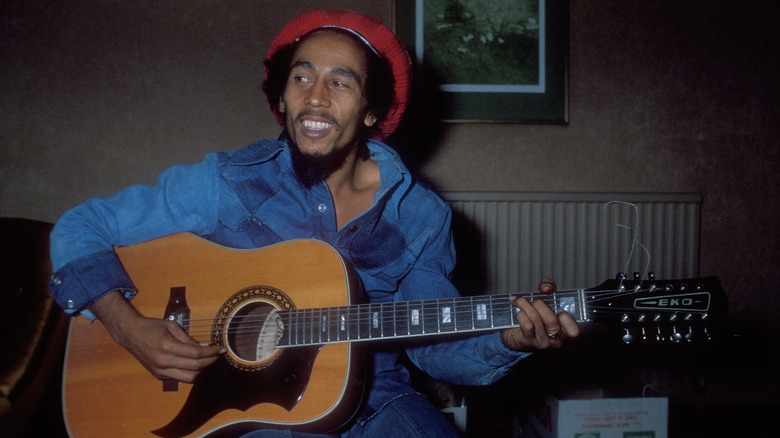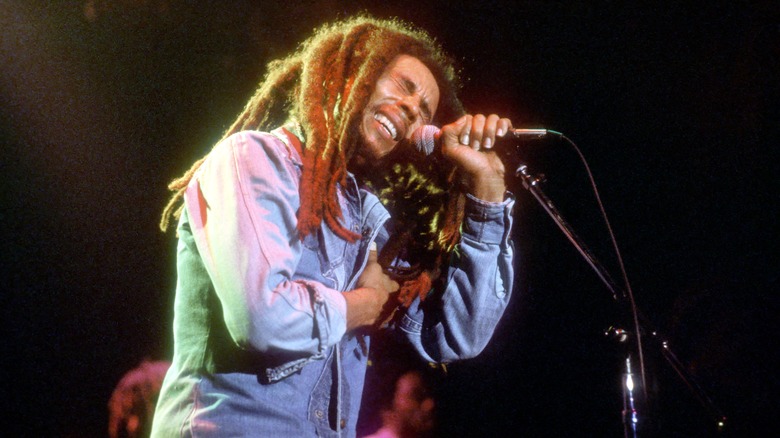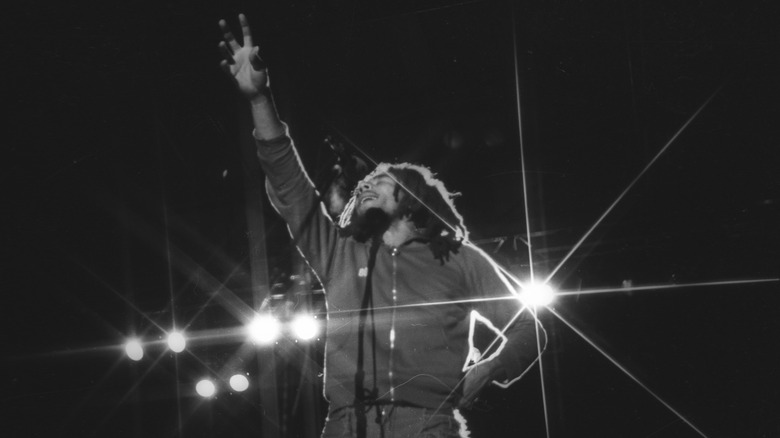The Most Tragic Thing About Bob Marley Everyone Forgets
When thinking of Bob Marley, most people would probably remember his music and his legacy. Songs like "Jamming," "One Love," "Buffalo Soldier," and more are part of our shared cultural fabric. Folks might know that he grew up in Kingston, Jamaica, in one of the city's most destitute neighborhoods, Trench Town. Fewer people might know about the assassination attempt on his life in 1976 mere days before he was scheduled to play at Smile Jamaica, a concert intended to ease political violence in his home country. But even fewer people might know about one of the most tragic facets of his life: how he died.
Bob Marley died young at 36 years old on May 11, 1981. Four years earlier in 1977 — the year after his assassination attempt — Marley noticed a strange discoloration under his right, big toenail. Doctors dismissed it as a soccer injury, but the discoloration didn't go away. In fact, it got worse. A biopsy revealed that not only did Marley have melanoma — a type of skin cancer — but a very rare type called acral lentiginous melanoma that grows on skin without hair.
Doctors told Marley that he had to amputate the toe, but Marley refused on religious grounds. By September 1980, he collapsed while jogging. The cancer had spread to his brain, lungs, and liver. By May the following year he was dead.
No amputation on religious grounds
The most tragic part of Bob Marley's death was not only that he died from melanoma, but that his death might have been preventable. Many people, if given the choice between losing a toe and potentially staying alive, would presumably choose amputation. But as RE:ONLINE says, part of Rastafari's belief involves following rules laid out in the biblical Old Testament, including those involving "cutting flesh." This is why, incidentally, Rastafarians grow out their hair. Other Old Testament practices — like those in the biblical book of Leviticus — involve not eating pigs or drinking alcohol and extend to using all-natural products for maintaining the hair and body.
Bob Marley, then, was simply following his beliefs. He did allow some flesh to be removed for surgical reasons and also allowed doctors to perform a skin graft, but stopped when it came to amputation. Eventually, his cancer metastasized and spread from one single toe to his entire body. In a piece for The Tribune, Dr. Cleland Gooding, a physician who specializes in skin disease, said that if Marley decided to amputate his toe, he "would have certainly prolonged his life or even saved it completely."
The Skin Cancer Foundation says that 71% of Black people diagnosed with acral lentiginous melanoma (ALM) survive over a five-year time — but only if it's caught early enough and not allowed to spread. ALM affects people of color more often than not, and contrary to other forms of melanoma, it's not caused by exposure to ultraviolet rays. The term "acral" refers to body parts like limbs, and "lentiginous" refers to the freckle-like, spotted appearance. This is how people can spot the cancer before it's too late.
'Money can't buy life'
As The New Yorker says, not only did Bob Marley's cancer spread, it spread aggressively. His manager, Danny Sims, once quoted the musician's doctor as saying that he had "more cancer in him than I've seen with a live human being." The doctor apparently also suggested that Marley live out his last months doing what he loved: performing.
Marley performed his final concert at the Stanley Theater in Pittsburgh on September 23, 1980, over seven months before he died in May the following year. Bob Marley's wife, Rita, said of the performance (via American Songwriter), "My strongest memory was of the audience, watching them observe his movement. Bob's connection to his music was spirit and power. He was such a force, and the audience felt his transformational liveliness."
By that time Marley hadn't made news about his illness public, and the audiences at any of his final concerts had no idea what was going on with the singer's health. Off-stage, however, Marley had collapsed days prior to the show while jogging in Central Park, New York City. Those who saw Marley at the time could see something was off, including Stanley Theater promoter Rick Engler. When Engler asked Marley if he was still going to perform, Marley said, "I need to do it for my band, they need the money. We're here; we're gonna play." Per the Mirror, Marley's last words to his son, Ziggy, were, "Money can't buy life."


